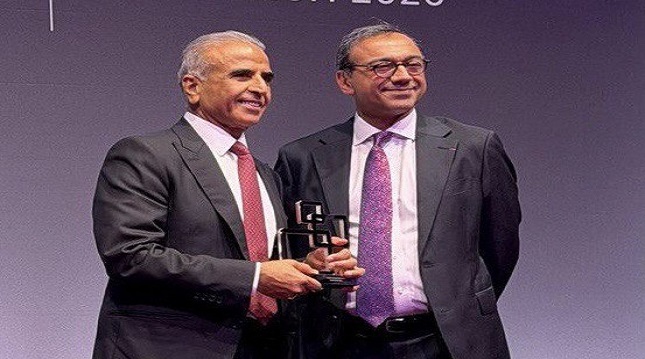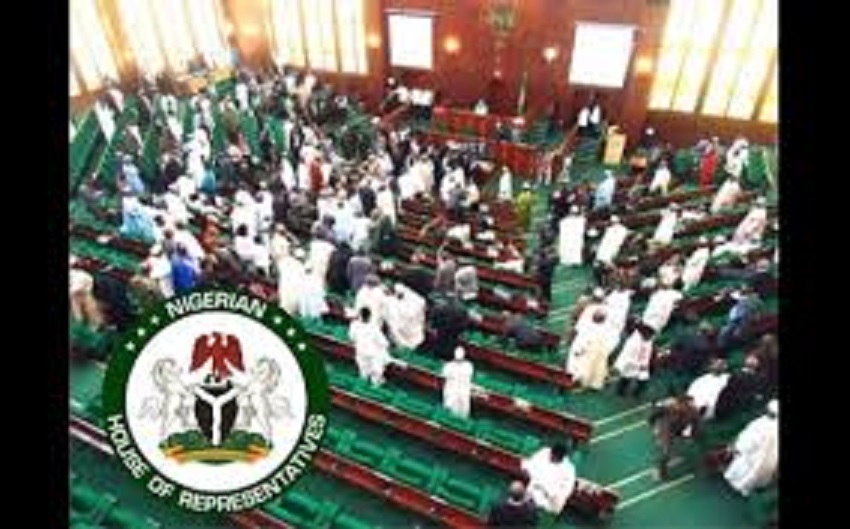Telecom
NCC Campus Conversation Moves to University of Abuja

The Nigerian Communications Commission (NCC) has held the maiden edition of the Campus Conversation at the University of Abuja. Campus Conversation is featured as an important part of NCC’s new Telecom Consumer Conversation (TCC).

Efosa Idehen, Director, Consumer Affairs Bureau, NCC, (Center) with other participants at the Main Campus of the University of Abuja over the weekend.
Speaking at the event, which held at the Main Campus of the University of Abuja at the weekend, NCC’s Director, Consumer Affairs Bureau, Efosa Idehen, said the Commission, as a consumer-centric regulator, has always been at the forefront of protecting the interest of the consumers.
He said the Commission has, over the years, embarked on many initiatives and programmes to deliver on its consumer protection mandate, as enshrined in the Nigerian Communications Act (NCA), 2003 and in line with other subsidiary legislations, guidelines, directions and determinations, in order to proactively address consumer concerns.
Idehen stated that, as a modified outreach programme, Campus Conversation takes life from NCC’s consumer protection and empowerment agenda as stipulated in the Commission’s Strategic Management and Vision Plans, as well as extant policies and well-conceived decisions of Management.
The objective of the Conversation is to ensure that the telecom consumers on university campuses are adequately informed and educated on their rights and privileges to acquire knowledge they require to take informed decision and protect themselves from unwholesome practices from service providers.
“Essentially, this maiden edition of our Campus Conversation is kicking off here at the University of Abuja today, as part of our strategic effort at creating awareness among the university students on their rights and obligations as telecoms consumers, as well as sensitising them on the many initiatives of the Commission designed to enhance consumer protection and empowerment,” Idehen said.
At the event, the NCC team led by Idehen, took turns to educate the campus community on Subscriber Identity Module (SIM) registration, the Benefits of National Identity Number (NIN)-SIM Integration, Cybersecurity and related online protection issues, among other initiatives of the NCC.
Participants were also enlightened on the various consumer-centric activities of NCC such as the NCC Consumer Complaint Toll-free Number 622; the Do-Not-Disturb (DND) Short Code 2442 instituted to manage unsolicited messages; the National Emergency Toll-free Number 112 which every citizen is expected to know and use during emergencies. Over twenty Emergency Communication Centres (ECCs) where 112 calls are received and escalated, have been constructed by the NCC and operational in different states of the federation and the Federal Capital Territory.
Other Information, Education and Communication (IEC) materials printed in bookmarks, handbills and stickers were distributed. The IECs cover a wide-range of topics on consumer concerns, including Consumer Bill of Rights, Complaints Management Process, Mobile Number Portability (MNP), SIM Registration, Obligations of Telecom Service Providers and the Consumers, and Tips on Managing Data Usage.
The event provided a rare opportunity to the students and other members of the University community to interface with the Commission. The NCC team responded to questions and comments relating to the participants’ experience with telecom services.
The Vice-Chancellor of University of Abuja, Prof. Abdul-Rasheed Na’Allah, who was represented at the forum by the University’s Head of Electrical and Electronic Engineering Department, Dr. Evans Ashigwuike, commended the NCC for the elaborate enlightenment programme hosted in the university community, which he described as highly beneficial to the students.
Na’Allah assured the Commission that the University will ensure that students, who attended the Consumer Conversation pass the knowledge gained and the IEC materials circulated by NCC to their fellow students for effective knowledge-sharing and education.
The TCC, now segmented and targeted at different consumer groups, comprises: The Village Square Dialogue, The Telecom Public Sphere, The Professionals’ Dialogue, Campus Conversation, Market Conversation and the National Youth Service Corps (NYSC) Sensitization.
Aside the TCC, other strategic outreach programmes of the Commission, delivered through its Consumer Affairs Bureau, include Consumer Telecom Town Halls on Radio, a phone-in radio dialogic programme to educate consumers at the grassroots; Telecom and The Citizen, a bi-monthly Twitter Live Chat targeting telecom consumers that are active on the social media; and Telecom TV Dialogue, a monthly television-based discourse on topical telecom issues.
Telecom
Sunil Bharti Mittal Conferred GSMA Lifetime Achievement Award for Transforming Global Telecommunications

The GSMA has conferred a rare Lifetime Achievement Award on Sunil Bharti Mittal, Founder and Chairman of Bharti Enterprises, recognising his role in reshaping the global telecommunications landscape and expanding connectivity across operators, governments, businesses and billions of consumers worldwide.

Bestowed on only a handful of industry leaders in the GSMA’s history, the honour recognises contributions that have left an enduring and defining mark on the global communications ecosystem.
The award was presented at Mobile World Congress in Barcelona in the distinguished presence of His Majesty Felipe VI, the Prime Minister of Spain, Pedro Sanchez, the President of Catalonia, Salvador Illa, and global industry leaders.
A visionary in the telecom sector, Sunil Bharti Mittal has built Bharti Airtel into one of the world’s leading mobile operators, with operations across India and Africa, ranking among the top three globally and serving over half a billion customers.
He pioneered the expansion of mobile services across emerging markets and served as Chairman of the GSMA from 2017 to 2018, where he championed policies that encouraged investment and innovation while strengthening the industry’s commitment to connecting the unconnected and advancing digital inclusion.
He was previously honoured with the GSMA Chairman’s Award in 2008 and again in 2016 for his outstanding contribution to the growth and development of the global mobile industry and was felicitated at Mobile World Congress in February 2019 in recognition of his Chairmanship.
On receiving the award, Sunil Bharti Mittal said, “I am deeply honoured to receive this recognition and sincerely thank the GSMA for this award. I accept it not only as a personal milestone, but as a tribute to India’s telecom journey, the collective spirit of Bharti, and the rise of Indian telecom companies on the global stage.
Equally the award reflects the progress of an industry that has connected billions and belongs to the customers we serve, the teams who built our institutions, and the partners who believe in the transformative power of connectivity.
Telecommunication is a force that expands opportunity, places essential services in the palm of every individual and unlocks human potential. Helping shape its evolution into a powerful accelerator of modern progress has been a privileged responsibility. As innovation accelerates, we will continue to work with our partners & stakeholders to ensure that growth advances equity and creates lasting opportunity for generations to come.”
The Lifetime Achievement Award is a rare honour, bestowed only on select individuals whose leadership and innovation have left an enduring mark on the industry.
Telecom
House Probes Fintech Regulation via Public Hearing on New Commission Bill

House of Representatives is pushing to regulate Nigeria’s fintech sector through a public hearing on “A Bill for an Act to Establish the Nigerian Fintech Regulatory Commission and for Related Matters (HB.2389).”

Speaker Tajudeen Abbas opened the hearing, stressing the need for stakeholder inputs to craft enforceable, constitutional laws addressing regulatory overlaps in digital banking, science, technology, and communications.
Abbas highlighted fintech’s role in Nigeria’s growth via digital payments, blockchain, crowdfunding, and financial inclusion for the unbanked, creating jobs and supporting SMEs under President Tinubu’s Renewed Hope Agenda.
He warned that lagging regulations cause fragmentation, compliance issues, and investor uncertainty, necessitating a coordinating commission for licensing, supervision, standards, and a level playing field without duplicating bodies like the Central Bank of Nigeria (CBN), SEC, NITDA, or NDIC.
The commission would protect consumers, monitor cybersecurity, ensure data privacy, and promote education while complementing existing regulators.
Committee Chairman Emmanuel Ukpong-Udo, overseeing digital banking, banking regulations, science, technology, communications, capital markets, and institutions, called the bill vital for harmonizing oversight amid Nigeria’s rise as Africa’s fintech hub with 430+ firms valued at billions.
Ukpong-Udo emphasized balancing innovation, stability, and coordination to avoid burdens on startups.
Bill sponsor Fuad Kayode Laguda argued the commission would streamline operations currently split among CBN, SEC, NITDA, NOTAP, and FIRS, boosting profitability, user security, and ease of business. He cited 2024-2026 stats: 250-430 firms, $230 billion market projection, $10.6 billion valuation for top nine, and $1.6 billion in mobile transactions.
Fintech stakeholders offered mixed views, with some backing unified regulation and others fearing overlaps with current mandates.
Telecom
Why Digital Trust Matters: Secure, Responsible AI for African SMEs?

By Kehinde Ogundare, Country Head, Zoho Nigeria
For years, security for SMEs across sub-Saharan Africa meant metal grilles and alarm systems. Today, the most significant risks are invisible and growing faster than most businesses realise.

Kehinde Ogundare
Artificial Intelligence has quietly embedded itself into everyday operations. The chatbot responding to customers at midnight, the system forecasting inventory requirements, and the software identifying unusual transactions are no longer experimental technologies. They are becoming standard features of modern business tools.
Last month’s observance of Safer Internet Day on February 10, themed ‘Smart tech, safe choices’, marked a pivotal moment. As AI adoption accelerates, the conversation must shift from whether businesses should use AI to how they deploy it responsibly. For SMEs across Africa, digital trust is no longer a technical consideration. It is a strategic business imperative.
The evolving threat landscape
Cybersecurity threats facing sub-Saharan African SMEs have moved well beyond basic phishing emails. Globally, cybercrime costs are projected to reach $10.5 trillion this year, fuelled by generative AI and increasingly sophisticated social engineering techniques. Ransomware attacks now paralyse entire operations, while others threats quietly extract sensitive customer data over extended periods.
The regional impact is equally significant. More than 70% of South African SMEs report experiencing at least one attempted cyberattack, Nigeria faces an average of 3,759 cyberattacks per week on its businesses, Kenya recorded 2.54 billion cyber threat incidents in the first quarter of 2025 alone, whilst Africa loses approximately 10% of its GDP to cyberattacks annually.
The hidden risk of fragmentation
A common but often overlooked vulnerability lies in digital fragmentation.
In the early stages of growth, SMEs understandably prioritise affordability and agility. Over time, this can result in a patchwork of disconnected applications, each with separate logins, security standards, and privacy policies. What begins as flexibility can involve into operational complexity.
According to IBM Security’s Cost of a Data Breach Report, companies with highly fragmented security environments experienced average breach costs of $4.88 million in 2024.
Fragmented systems create blind spots, each additional data transfer between applications increases exposure. Inconsistent security protocols make governance harder to enforce. Limited visibility reduces the ability to detect anomalies early. In practical terms, complexity increases risk.
Privacy-first AI as a competitive differentiator
As AI capabilities become embedded in business software, SMEs face a choice about how they approach these powerful tools. The risks are not merely theoretical.
Consumers across Africa are becoming more aware of data rights and willing to walk away from businesses that cannot demonstrate trustworthiness. According to KPMG’s Trust in AI report, approximately 70% of adults do not trust companies to use AI responsibly, and 81% expect misuse. Meanwhile, studies also show that 71% of consumers would stop doing business with a company that mishandles information.
Trust, once lost, is difficult to rebuild. In the digital age, a single data leak can destroy a reputation that took ten years to build. When customers share their payment details or purchase history, they extend trust. How you handle that trust, particularly when AI processes their data, determines whether they return or take their business elsewhere.
Privacy-first, responsible AI design means building intelligence into business systems with data protection, transparency and ethical use embedded from the outset. It involves collecting only necessary information, storing it securely, being transparent about how AI makes decisions, and ensuring algorithms work without compromising customer privacy. For SMEs, this might mean choosing inventory software where predictive AI runs on your own data without sending it externally, or customer service platforms that analyse patterns without exposing individual records. When AI is built responsibly into unified platforms, it becomes a competitive advantage: you gain operational efficiency whilst demonstrating that customer data is protected, not exploited.
Unified platforms and operational resilience
The solution lies in rethinking digital infrastructure. Rather than accumulating disparate tools, businesses need unified platforms that integrate core functions whilst maintaining consistent security protocols.
A unified approach means choosing cloud-based platforms where functions share common security standards and data flows seamlessly. For a manufacturing SME, this means inventory management, order processing and financial reporting operate within a single security framework.
When everything operates cohesively, security gaps diminish and the attack surface shrinks. And the benefits extend beyond risk reduction: employees spend less time on administrative friction, customer data stays consistent, and platforms enable secure collaboration without traditional infrastructure costs.
Safer Internet Day reminds us that the digital world requires active stewardship. For SMEs across the African continent who are navigating complex threats whilst harnessing AI’s potential, digital trust is foundational to sustainable growth. Security, privacy and responsible AI are essential characteristics of any technology infrastructure worth building upon. Businesses that embrace unified, privacy-first platforms will be more resilient against cyber threats and better positioned to earn and maintain trust. In a market where trust is currency, that advantage is everything.

 E-Financial1 day ago
E-Financial1 day agoIran-Israel-US Conflict and CBN’s FX Gains: A Stress Test for Nigeria’s Monetary Stability

 E-Financial1 day ago
E-Financial1 day agoMutual Benefits Assurance Reaffirms Full Regulatory Compliance, Enhanced Governance

 General News1 day ago
General News1 day agoJAMB Uncovers AI-Driven Fraud Targeting UTME Candidates, Warns Parents

 General News1 day ago
General News1 day agoSERAP Asks FCCPC to Investigate Google, Meta, Others over Alleged Rights Abuses

 News1 day ago
News1 day agoFlashChange CEO, Bidemi Oke, Urges Startups to Build Strong Governance Structures Early

 News1 day ago
News1 day agoTeamApt, Awabah Partner to Boost Pension Drive for Nigerians

 General News1 day ago
General News1 day agoCapelli Institute Commits to Advancing Trichology in Nigeria

 E-Financial1 day ago
E-Financial1 day agoReps Mull Commission to Regulate Fintech Operations



























